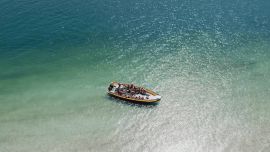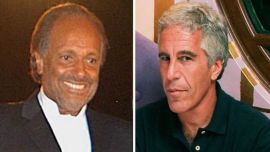Argentina goes to the polls on Sunday with Peronist politician Alberto Fernández, backed by former president Cristina Fernández de Kirchner, expected to win an outright majority, something that has got the residents of the Malvinas (Falklands) Islands worried.
The islands have been in British hands since 1833 but Argentina has waged a diplomatic battle since the 1960s to try to gain control of the archipelago. Argentine troops invaded the windswept islands for 74 days in 1982, before Britain swiftly defeated them.
And while few islanders believe Argentina would invade again, it is the economic impact of another hostile government that concerns them the most.
"They do their best to upset our economy putting all sorts of sanctions on various things and just being generally unpleasant," complained Shirley Hirtle, 76, who works at the Historic Dockyard Museum in the capital Stanley.
Relations had improved under the Mauricio Macri administration since 2015. But Peronist frontrunner Alberto Fernández warned in a presidential debate recently that he wanted to "renew sovereignty claims" over the more than 750 islands.
Asked about the potential return to power of a Peronist, Hirtle said she was "very angry about it."
"They're totally brainwashed from birth onwards. They rewrite their own history," she declared.
Hirtle pointed to the 2013 referendum on the island where 99.8 percent of islanders voted to remain British. Of the 1,517 voters, only three said 'No', while one ballot was invalid.
"In Argentina, I'm sure there are plenty of people who'd like to see an island have their own freedom and the right to their own self-determination, but there are other people who don't want that," said Sally Heathman, 25, a communications and media assistant for the Falkland Islands government.
Britain has claimed the disputed islands since settling the West island in 1765, while Argentina says it inherited the archipelago from former colonial power Spain, which invoked sovereignty in 1767 after purchasing a French settlement on the East island.
'Saber rattling’
Under Fernández de Kirchner, the Argentine government made threatening noises regarding the islands and their main link with the outside world: the weekly flight to and from Chile's capital Santiago, which uses Argentine airspace. With a second weekly flight from Sao Paulo in Brazil due to begin in November, a change of administration in Buenos Aires could put that at risk.
"I wouldn't be at all surprised if there was [...] a problem with the second flight," said Keith Heathman, 76, a driver for Battlefield Tours.
The flight from Santiago, through Punta Arenas on Chile's southern tip, is operated by LATAM, which will organise the São Paulo fight.
Sally Ellis, 48, is the Falklands agent for LATAM and says the Chilean-based company won't allow any mention of the islands in its inflight magazine. She said in the past there has been pressure to stop the flight but branded it "saber rattling."
Many Argentines, such as 50-year-old Walter Goncalves, visit the islands to pay their respects at the Argentine cemetery near Darwin.
Goncalves braved the biting cold, wind, sleet and snow to hike key battlegrounds such as Mounts Longdon, Tumbledown and Two Sisters.
"I didn't want to die without seeing them," he told AFP. "Malvinas is a battle that isn't over for an Argentine. It's a battle in which an Argentine will always try to have them recognised as Argentine, because they are Argentine."
Once a month, the Santiago flight stops off in Río Gallegos in Patagonia, while the new São Paulo flight is due for a monthly stop in Córdoba.
"It would be cutting off their nose to spite their face," if Argentina impeded those flights, said Ellis.
'They asked for a bribe'
Some, though, fear for the future if the liberal, market-friendly Macri loses the election.
Australian Darrel Day, who runs an adventure tourism company out of Stanley, said that under the previous Kirchnerite administration he had a yacht seized in Argentina and had to pay a US$186,000 bond in cash to release it.
"They openly asked for a bribe," said the 49-year-old. "Macri got on top of the corruption. Dealing with aduana [customs] is a lot easier" now.
"That's why I'm so worried about" Fernández winning the election.
These islanders are a resilient bunch, though, and know how to manage hardship. Occasionally the boat carrying food supplies is delayed due to bad weather.
"You're running a bit low on your food stores and you think: oh it's OK, I can get it from a tin or there's meat in the freezer or something along those lines," said Sally Heathman.
– AFP
by Barnaby Chesterman, AFP

















Comments